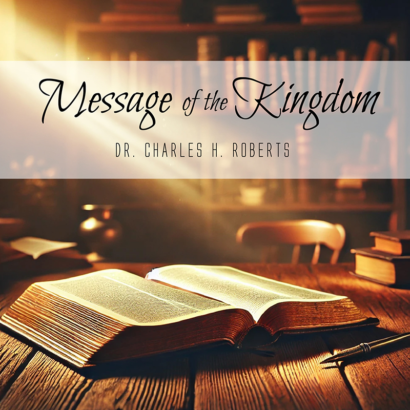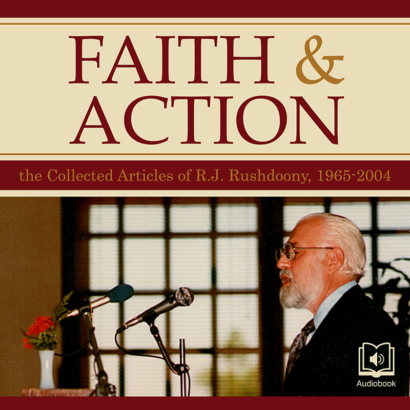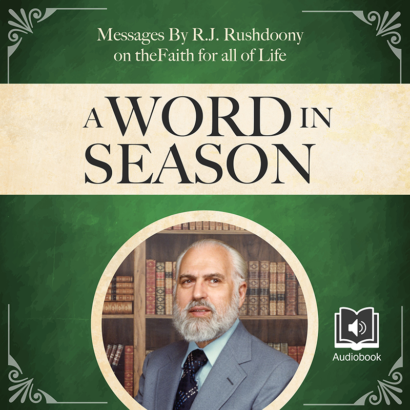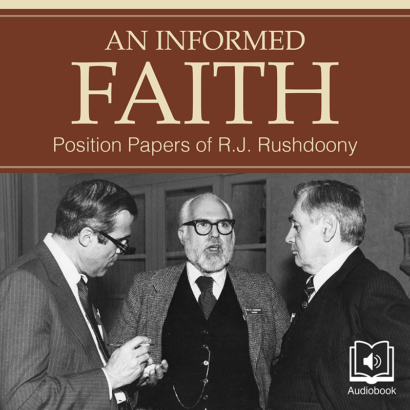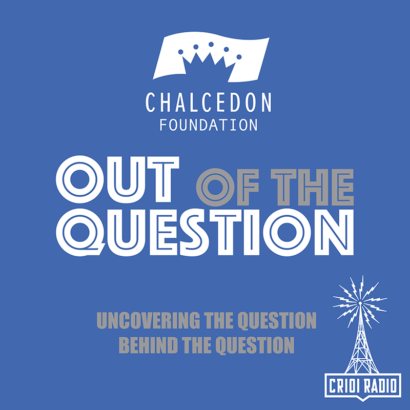
Polytheistic Salvation (The Doctrine of Salvation)
• Jun, 27 2024
Join R.J. Rushdoony for another sermon in his lecture series, " The Doctrine of Salvation!"
Hosted by
Chalcedon Founder
- Series: Rushdoony Radio
- Topics:
Polytheistic Salvation
R.J. Rushdoony
Let us pray.
* * *
Father, we thank thee that thou art on the throne, and we come to thee again to cast our every care upon thee who carest for us. We pray for Dr. Lester Roloff, for the persecuted churches and Christian schools of California and of all the country, and we pray, our Father, that thou wouldst give them the faith and the courage to continue their stand, and to triumph, for this is the victory which overcometh the world, even our faith. Open the eyes of the blind that they may see that indeed the unregenerate manifest enmity, hatred against thee. And that humanism must be destroyed if thy church is to be free. Bless us now as we give ourselves to the study of the things that are of thee. In Jesus' name, amen.
* * *
The first of our two sessions this evening will deal with ‘polytheistic salvation.’ ‘Polytheism’ means the worship of many gods, and of course, the Ten Commandments speaks directly to this. We read in Deuteronomy 5:6 following:
“I am the LORD thy God, which brought thee out of the land of Egypt, from the house of bondage. Thou shalt have none other gods before me. Thou shalt not make thee any graven image, or any likeness of any thing that is in heaven above, or that is in the earth beneath, or that is in the waters beneath the earth: Thou shalt not bow down thyself unto them, nor serve them: for I the LORD thy God am a jealous God, visiting the iniquity of the fathers upon the children unto the third and fourth generation of them that hate me, And shewing mercy unto thousands of them that love me and keep my commandments.” 1
The Ten Commandments, thus, begins with a very strong statement against polytheism, the worship of many gods, and idolatry, the worship of man-made images, man-made gods.
Now, as we approach the subject of polytheism, one of the things that is hardest for us as we confront the subject is to face it biblically. We are saturated in our day with the teachings of the public schools, with the myth of evolution, which is in the air all around us. So that, as we think of the worship of many gods, we think of primitive men, the people in Africa, and the Pacific islands, or in out-of-the-way places in Asia and so on. Somehow, we associate polytheism with backwardness, with primitiveness, but this is exactly one hundred percent wrong. All the evidence points to the fact that, in the earliest days of mankind, there was, as Dr. Schmidt some years ago ascertained, a widespread belief in one god. Polytheism was a latecomer in the history of civilization. Even more, it was an indication of cultural decay and degeneration. When people adopted polytheism, unless it was arrested by another faith coming in, Christianity, they went down to the bottom level to what we would call the level of savages. So that people do not believe in polytheism because they are primitive or savages, because they believe in polytheism, they become savages.
How can we best understand polytheism? Well, perhaps the easiest way is to begin with polytheism today, to examine what it involves, and to see what it leads to. I am going to use a polytheist whose base, during the fifties and sixties, was not too far away, about 130 miles away. Berkeley, California, the University of California at Berkeley, the president Clark Kerr.
Now, Clark Kerr is a highly educated man. He was, for a time, the chief executive officer of the entire University of California system. He was a professor of economics, and held a number of distinguished offices, but Clark Kerr was a polytheist. In his book, The Idea of the University, he developed his polytheism, and he said that we must speak of the modern university no longer as a university, but as a multi-versity. He could have said a poly-university, same meaning. Why? He dissented with Cardinal Newman and his book on the idea of the university. 2
Now, Cardinal Newman, while a Catholic, stated very clearly the Christian doctrine of the university, the idea of the university comes from the Bible. One God, one universe of law, one body of knowledge which is unified. There isn’t one kind of universe for mathematics and another for physics. One kind for astronomy and another for biology. They are one universe, but not so in modern thinking. Having abolished from their thinking, from their intellectual purview the idea of God, they become polytheists. There is no unity in the universe. It’s a multi-verse. There are many truths, many possibilities, and here in our solar system we may have one kind of thing, but somewhere else in another system, there’ll be another truth, another thing, and the two will have no unity. As a result, for Clark Kerr, the idea of truth was obsolete. The idea of meaning was obsolete. There is no meaning in the universe.
Thomas Kuhn, editor of the current Encyclopedia of Chemistry has said that all our ideas throughout history whereby we have approached the world are myths. The Phlogiston theory earlier that was used, now evolution, these are all myths because there is no such thing as truth. There are handles with which we approach reality and after a while, the paradigm, that was the word he used, wears out, and we drop this paradigm and we pick up another, but none of them have any reality. 3 None of them have any approach to truth, the just ways whereby we handle the world. Meaning doesn’t exist in the world. Truth doesn’t exist in the world. law doesn’t exist in the universe. It isn’t a universe, it’s a multiverse.
You see, Clark Kerr was a polytheist, and the University of California system is made up on polytheists. This is why Gunther Stent, the prize winning molecular biologist there has said that ultimately we will develop downhill into savages, in two centuries, and then mankind will disappear. 4 Clark Kerr says it is a multi-versity. Gunther Stent says it will disappear in time. We will become savages, living in terms of the pleasure principle. Well, they’re making real strides towards it. After all, several years back, someone got a masters degree in occultism and witchcraft at Berkeley, and they’re giving marvelous courses on such things as comic books now. So, you can graduate from Berkeley and not know much more than Superman and a few other comic book heroes.
I think you see the point. When you lose faith in the God that created Heaven and Earth, unity goes, and the universe is just a universe of many powers, many things, miscellaneous things.
Gerardus van der Leeuw, the phenomenologist, said that polytheism gives us: “the chaotic world of many potencies.” 5 Nothing is related to anything else. All you have in the world then are powers, the power of electricity, of gravity, of lightning, of death. Power is the only thing that remains, you see. In polytheism truth goes, meaning goes, power remains. Power and nothing but power. There is no overarching truth, no overarching meaning or justice, or right in the universe. Only the clash of powers. So, whenever you have polytheism, whether it’s the Norse gods, or the Greek gods, or the gods of India, or the modern world, power and the clash of power takes over and imperialism is basic to polytheism. Whenever you have a polytheistic world, it becomes an imperialistic world, because you have no mission. You cannot be a polytheistic person and a missionary. You can only be an imperialist.
Now, I said that polytheism was a latecomer in civilization. After I began to work on the subject, I found an old Greek writer who said the same thing: Herodotus. Herodotus said that polytheism was about four hundred years ago, and he said it came from Hesiod and Homer. This is what he said:
“Whence each of the gods sprung, whether they existed always, and of what form they were, was, so to speak, unknown until yesterday. For I am of the opinion that Hesiod and Homer lived four hundred years before my time, and not more, and these were they who framed a theogony for the Greeks, and gave names to the gods, and assigned to them honors and arts, and declared their several forms. But the poets, said to have been before them, in my opinion, were after them. The first part of the above statement is derived from the Dodonaean priestesses; but the later, that relates to Hesiod and Homer, I say on my own authority.” 6
Now, that was Herodotus. When we look at Homer, we find that, for him, that the power of a god depended on his presence. He couldn’t act on things from a distance. Moreover, since the gods represented no morality, no right and wrong, just power, the gods were only interested in persons of power. When you go to any polytheistic faith anywhere in the world, the same thing is true. The gods are never interested in the common man, or the loser. They’re only interested in the people of power. They represent power and the only thing that interests them is power, not truth.
Now, I said I was talking this evening about polytheistic salvation. That term is a contradiction, because there can be no salvation in polytheism. If, instead of a universe, you have a multi-verse, how can any one power or god in that multi-verse control everything? He can’t, because everything is at odds with everything else, and everything has its own nature, and there is no word or truth, or meaning, or law to bind them together. As a result, whenever you find polytheism, you never find a doctrine of salvation. It may sometimes call certain things salvation, but they are only escape. It offers escapism. Let me illustrate.
In Homer, the great example of salvation is Paris. Here is Paris who’d run off with Menelaus, the wife of Helen of Troy, and there before the walls of Troy, the angry husband is bearing down on him. And it looks back for Paris because he cannot cope with that man. So what happens? The goddess Aphrodite picks him up out of the battlefield and he suddenly disappears, and plops him into a boudoir with Helen. Now, that’s Greek salvation. But the problem of guilt, the problem of sin that was Paris’s was not faced, nor the fact that the Greeks were still outside of the wall and were soon going to destroy Troy. There was no salvation for Paris from sin and death. Polytheistic salvation is never salvation. It is only a foolish escapism, only the God who absolutely controls all creation can give effectual salvation. If God is not absolutely in control of all Heaven and earth, and every moment of time from the first day of creation to the last, and absolutely in control of all eternity, your salvation is not secure. You can be saved today and you can lose it tomorrow, or you can be saved for a million years, and on the million and first year, something happens that’s outside of God’s control and you’ve lost it. You see, unless you have the absolute sovereign God of Scripture, you have no assurance of salvation.
Salvation is thus, a biblical doctrine. All other religions offer escapism, but their escape is no escape. It always sidesteps the problem of sin, and so it sidesteps salvation. But the sad fact is that polytheism is very common in the church, and too many churchmen today are polytheists, and all they have to offer to people is a polytheistic religion, and a polytheistic salvation or escape.
Let me quote a bit from one contemporary, or at least recent theologian, Leonard Verduin, Christian Reformed, supposedly a good, sound Calvinist, but actually a heretic, who wrote:
“...the state is not subject to redemption … The state is … purely temporal and strictly secular—secular in the etymological sense of the word, of this age (saecula), for the here and now … This implies that there cannot be such a thing as a ‘Christian state.’” 7
Now, consider the implications of that statement. If anything is of the here and now, purely, it is secular and therefore, it cannot be Christian. Well, logically, he should then say that marriage cannot be Christian, because our Lord himself says that there’s no marriage in Heaven, but can we call it impossible for marriage to be Christian? We can go on down the line, eating and drinking, much more. Work, such as we do in this world, these are for this age. True, there may be eating and drinking in the New Creation, and there will be work, but it will be different. So, therefore, what we do now is secular, according to Verduin’s logic. But that’s nonsense. We are told in Scripture that “whether we eat or drink, we are to all to the glory of God.” And that all things are to be done unto the Lord, and we are told that the powers that be, the civil authorities, are ministers of God, and the word is literally “deacons,” called upon to serve Him.
Now, you see the implications? If we say that we’re going to confine the Word and God and the Gospel to the church, and not much else, then we’re polytheists, and we say our God functions here, but out here he doesn’t function. But the God of the Scriptures is God of the church, and of the state, and of the home, and of the school, of the arts and the sciences, and all things, and we cannot restrict Him to one area without being polytheists.
Well, this tells us something about the church today. It’s full of polytheists, and people are calling all the time to tell about their problem with polytheists in the church. One woman who called when I was gone and Dorothy answered the phone, said that a group of them were praying in their church for the Christian school and the pastor was praying for them, because he felt they had gone astray, into the social gospel, or into things that were supposedly extraneous to the Gospel. Well, that’s polytheism, and it’s very prevalent today.
Whenever we try to say that any part of the world, or life, or any subject is outside the Lord, we are polytheists. When we limit salvation to the soul and to the church, we are polytheists. We then are saying our God is so little that he has no word nor law for all these other areas. The saddest fact is that these polytheistic churchmen will actually say that theirs is the pure gospel. Well, when you have that kind of pretended gospel, you have a world of imperialism, a clash of powers, because there is no God and His Word that governs every area, that speaks to the state, to the church, to the school, to the arts, to the sciences, to all things else. And as the gods of the polytheist grows smaller, the disunity of the world grows greater.
Idolatry is reductionism. The supposedly great modern novelist, F. Scott Fitzgerald, once said of his prospective wife: “Zelda’s the only God I have now.” 8 Well, idolatry is like that, you see. It always reduces God. Fitzgerald reduced God to the dimensions of his prospective wife, who spent most of her life not too long after her marriage, in a mental institution. He didn’t have much of a god, and no polytheist does. Idolatry says that we can create an image of God. That’s reductionism. It says the meaning of God can be comprehended in our idol, or our picture. Idolatry is always a part of polytheism, and a major step into far-reaching polytheism. What idolatry tries to do is to say here is a god that can be understandable, but if God is God, He is so great that the mind of man cannot conceive him. Understand, yes, but not to comprehend.
Idolatry presupposes a polytheistic world, and in a polytheistic world, there is no overarching meaning or truth, only a few pockets of truth that a man creates. Polytheism always witnesses to cultural decay and degeneration, and to a defeated world. It has a faith not in truth, but in hopeless conflict, and it attempts to hold a little corner of meaning in an ocean of nothingness.
Thus, for churchmen to embrace polytheism to any degree is to prize defeat rather than the Lord and his salvation. If we worship the Lord, then we worship one who is Lord of all things, and we apply His Word to every area of life and thought, and to every person under the sun.
* * *
Are there any questions now? Yes?
[Audience] Could this be one reason why pietism tends to narrow and narrow the element of spirituality? In other words, the honing in on, it’s the Holy Spirit. If we only can get down about the Holy Spirit can we have the Christian life. Or, it is this part which getting smaller and smaller which is what you need to know in order to have the truth of God.
[Rushdoony] Very good. It is pietism which narrows the area of the faith increasingly, until the limits become simply the spiritual experience of the individual. And pietism has always gone hand in hand with polytheism. Because if you cannot put your faith in an absolute God, where are you going to put it? In your experience, you see, how I feel about things.
Now, what does Moses say to Israel in one of his very last words?
The eternal God is thy refuge,
And underneath are the everlasting arms:9
But the pietist wants to have that glow, that inner glow. That’s what he puts his trust in, not the everlasting arms. “It’s my experience.” And the result today is we have a lot of religious tramps who go from meeting to meeting, searching for that glow, that experience, and the result is no growth, no impact on the world, no relevance to the world around him.
Yes?
[Audience] One of the Journal articles that I’ve been using to revise my thesis does an excellent delineation of the sources of pietism in Medieval England, and one of the major strains or drives of the early pietists, the mystical variety, was to fly from the world and to have a union. They were trying to become one with God, so it’s a practical pantheism at the same time. Which is the same drive you find in Eastern religions, Hinduism, or Buddhism. It’s always trying to get out of the world of things and to go back and become one with the Dao, or with the One, or whatever.
[Rushdoony] Yes. Well, it’s significant that you brought up the Medieval pietism, because pietism always leads to exactly what it did in the Middle Ages, to a flight from the world, to the convent and the monastery. And Dr. Kuehnelt-Leddihn has said that the most Medieval of institutions today is the modern Protestant church with its emphasis on pietism, withdrawal from the world into a new type convent or monastery, the pietistic church. You just shut the doors to the world and to all problems. Yes?
[Audience] Going back to the, in the area of idolatry. Can we run into a problem with images and so forth, with the pictures of Christ? Is there a real problem with that, pictures and so forth?
[Rushdoony] Yes, a very good question. We have, in our day, come to rely very heavily in churches and Sunday School especially, on pictures of Christ. Moreover, it is interesting to see what has happened to the pictures of Christ. When we go back to the earlier pictures in the earlier Middle Ages, Christ is presented as a king on the throne. When the pietism developed, He now was presented increasingly as a little bambino in his mother’s arms, and a very sentimental approach began to take over. Then, the Renaissance artists came along, about the same time, and while their portrayal was more varied than the bambino Christ, they portrayed him like a Renaissance, Neoplatonic artist or writer with long hair, somewhat effeminate. And that portrayal has remained with us until our day.
Then, on top of that, in recent times beginning back in the thirties, the emphasis on the very humble worker, Jesus, the every day fellow, has been very predominant in the depictions. So, they have become a form of idolatry in that they have taken Christ off the throne. There hasn’t been, I don’t believe, in more than a handful of pictures painted in the past few centuries of Christ on the throne, where at least he was seen at the Lord. The emphasis now is on the human side of Jesus. So much so that in many churches today, the word ‘authority,’ I find across country, is taboo. A pastor wanted to give a series on authority in the life of the Christian; the authority of scripture, the authority of God, the authority of the Son, the authority of the Holy Spirit, and so on, was told by a church officer that the whole idea was repugnant, that we shouldn’t think of God in terms of authority, but fellowship.
Well, Paul says we do have fellowship with the Father through the Son, and so does John, but only when we submit to their authority. There is no fellowship apart from that submission.
Any other questions or comments?
Well, if not, we’ll take a break of a few minutes and then resume.
1 Dt 5:6–10.
2 John Henry Newman. The Idea of a University: Defined and Illustrated. Edited by Frank M. Turner. London: Basil Montagu Pickering, 1875.
3 See Thomas S. Kuhn. Structure Of Scientific Revolutions. Second Edition, Enlarged. Vol. 2. Encyclopedia of Unified Science 2. Chicago: University of Chicago Press, 1970.
4 See Gunther S. Stent. The Coming Of The Golden Age; A View Of The End Of Progress. Garden City, New York: The American Museum of Natural History, The Natural History Press, 1969.
5 Gerardus Van Der Leeuw: Religion in Essence and Manifestation. J.E. Turner, translator: (New York, New York: Macmillan, 1938). p. 169. Rushdoony, R. J. (1994). Systematic Theology in Two Volumes (Vol. 1). Ross House Books.
6 Henry Cary, translator: Herodotus, II. (New York, New York: Harper and Brothers, 1879). p. 116. Rushdoony, R. J. (1994). Systematic Theology in Two Volumes (Vol. 1). Ross House Books.
7 Leonard Verduin: The Anatomy of a Hybrid, a Study in Church-State Relationships. (Grand Rapids, Michigan: Eerdmans, 1976). p. 35f. Rushdoony, R. J. (1994). Systematic Theology in Two Volumes (Vol. 1). Ross House Books.
8 Sheilah Graham: The Real F. Scott Fitzgerald. (New York, New York: Grosset-Dunlap, 1976). p. 58.
9 The Holy Bible: King James Version, Electronic Edition of the 1900 Authorized Version. (Bellingham, WA: Logos Research Systems, Inc., 2009), Dt 33:27.
More podcasts in series

The Joyful and the Healing Church (Doctrine of the Church)
Aug 28, 2025

The Laying on of Hands (Doctrine of the Church)
Aug 26, 2025

Ritual (Doctrine of the Church)
Aug 21, 2025

Presbyters (Doctrine of the Church)
Aug 19, 2025

Ministers (Doctrine of the Church)
Aug 14, 2025

The House of God (Doctrine of the Church)
Aug 12, 2025

The Holy Assembly (Doctrine of the Church)
Aug 07, 2025

The Assembly or Congregation (Doctrine of the Church)
Aug 05, 2025

The Sabbath (Doctrine of the Church)
Jul 31, 2025

The Passover (Doctrine of the Church)
Jul 29, 2025

Training for Government (Doctrine of the Church)
Jul 24, 2025

Government (Doctrine of the Church)
Jul 22, 2025

Circumcision (Doctrine of the Church)
Jul 17, 2025

Faith and the Church (Doctrine of the Church)
Jul 15, 2025

Introduction to the Doctrine of the Church (Doctrine of the Church)
Jul 10, 2025

The Interpretation of History, II (American History to 1865)
Jul 08, 2025

The Interpretation of History, I (American History to 1865)
Jul 03, 2025

De Tocqueville on Democracy and Power (American History to 1865)
Jul 01, 2025

Sin and Sins (Doctrine of Sin)
Jan 30, 2025

The View of Sins as Virtues (Doctrine of Sin)
Jan 28, 2025

Fables (Doctrine of Sin)
Jan 23, 2025

Sin as a Political Asset (Doctrine of Sin)
Jan 21, 2025

Sin and False Perfectionism (Doctrine of Sin)
Jan 16, 2025

Sin and Matter (Doctrine of Sin)
Jan 14, 2025

Sin as Personal Fulfillment (Doctrine of Sin)
Jan 09, 2025

Sin and Society (Doctrine of Sin)
Jan 09, 2025

Sin as Deprivation (Doctrine of Sin)
Jan 09, 2025

Total Depravity (Doctrine of Sin)
Jan 09, 2025

The Origin of Sin (Doctrine of Sin)
Jan 09, 2025

The Religious Nature of Sin (Doctrine of Sin)
Jan 09, 2025

Man in 1984: Orwell (Aspects of American History)
Jan 09, 2025

Of the People, By the People, and For the People (Aspects of American History)
Jan 09, 2025

Volunteerism in American Politics vs. Humanist Elitism
Dec 12, 2024

America Belongs to Americas: Monroe Doctrine (Aspects of American History)
Dec 10, 2024

The American Indian (Aspects of American History)
Dec 05, 2024

A Return to Slavery (Aspects of American History)
Dec 03, 2024

The Certainty of Victory (Daniel: Thy Kingdom Come)
Dec 02, 2024

The Target (Daniel: Thy Kingdom Come)
Nov 26, 2024

Liturgy of the Messiah (Daniel: Thy Kingdom Come)
Nov 21, 2024

Confusion of Faces (Daniel: Thy Kingdom Come)
Nov 19, 2024

Perspective of History (Daniel: Thy Kingdom Come)
Nov 14, 2024

The Course of Dominion (Daniel: Thy Kingdom Come)
Nov 12, 2024

Sovereignty and Justice (Daniel: Thy Kingdom Come)
Nov 07, 2024

The Balances of Justice (Daniel: Thy Kingdom Come)
Nov 05, 2024

Ritual Center of the Earth (Daniel: Thy Kingdom Come)
Oct 31, 2024

The Continuation of God (Daniel: Thy Kingdom Come)
Oct 29, 2024

The Terror of Dreams (Daniel: Thy Kingdom Come)
Oct 24, 2024

The Offense of Daniel (Daniel: Thy Kingdom Come)
Oct 22, 2024

Authority and Life (The Doctrine of Authority)
Oct 17, 2024

The Power to Kill (The Doctrine of Authority)
Oct 16, 2024

Authority, Justice, and Men (The Doctrine of Authority)
Oct 10, 2024

Satanic Authority (The Doctrine of Authority)
Oct 09, 2024

The Seraphim (The Doctrine of Authority)
Oct 03, 2024

The Cherubim (The Doctrine of Authority)
Oct 01, 2024

Authority: Primary and Secondary (The Doctrine of Authority)
Sep 26, 2024

The Source of Authority (The Doctrine of Authority)
Sep 24, 2024

The Purpose of Authority (The Doctrine of Authority)
Sep 20, 2024

By What Authority?
Sep 17, 2024

Authority and Ministry (The Doctrine of Authority)
Sep 12, 2024

Authority and False Responsibility (The Doctrine of Authority)
Sep 10, 2024

Undermining Authority (The Doctrine of Authority)
Sep 05, 2024

Authority and Power (The Doctrine of Authority)
Sep 04, 2024

Living Under Authority (The Doctrine of Authority)
Aug 29, 2024

The Spirit of Adoption (The Doctrine of Authority)
Aug 27, 2024

The Power of His Resurrection (The Doctrine of Authority)
Aug 22, 2024

Man's Relationship to Authority (The Doctrine of Authority)
Aug 22, 2024

Author and Authority (The Doctrine of Authority)
Aug 22, 2024

Glorification: Part 4 (The Doctrine of Salvation)
Aug 13, 2024

Glorification: Part 3 (The Doctrine of Salvation)
Aug 08, 2024

Glorification: Part 2 (The Doctrine of Salvation)
Aug 06, 2024

Glorification: Part 1 (The Doctrine of Salvation)
Aug 01, 2024

Perseverance (The Doctrine of Salvation)
Jul 30, 2024

Preservation (The Doctrine of Salvation)
Jul 25, 2024

Sanctification (The Doctrine of Salvation)
Jul 23, 2024

Justification (The Doctrine of Salvation)
Jul 18, 2024

Conversion: Faith and Repentance (The Doctrine of Salvation)
Jul 16, 2024

Regeneration (The Doctrine of Salvation)
Jul 11, 2024

Predestination (The Doctrine of Salvation)
Jul 09, 2024

Election (The Doctrine of Salvation)
Jul 04, 2024

The Evangel or Gospel (The Doctrine of Salvation)
Jul 02, 2024

Effectual Calling (The Doctrine of Salvation)
Jun 25, 2024

Cosmic Salvation (The Doctrine of Salvation)
Jun 20, 2024

Salvation: Anthropology or Theology? (The Doctrine of Salvation)
Jun 18, 2024

Humanistic Salvation (The Doctrine of Salvation)
Jun 13, 2024

Salvation (The Doctrine of Salvation)
Jun 11, 2024

Ordo Salutis: The Order of Salvation (The Doctrine of Salvation)
Jun 06, 2024

Foundations Tested (The Sermon on the Mount)
Jun 04, 2024

False Faith (The Sermon on the Mount)
May 30, 2024

The Test of Profession (The Sermon on the Mount)
May 28, 2024

The Narrow Way (The Sermon on the Mount)
May 23, 2024

The Golden Rule
May 21, 2024

The Assurance of Answers (The Sermon on the Mount)
Apr 30, 2024

Judging (The Sermon on the Mount)
Apr 25, 2024

Anxiety (The Sermon on the Mount)
Apr 23, 2024

Deliver Us From Evil (The Sermon on the Mount)
Apr 18, 2024

Debts (The Sermon on the Mount)
Apr 16, 2024

The Peacemakers (The Sermon on the Mount)
Apr 11, 2024

Blessed are the Pure in Heart (The Sermon on the Mount)
Apr 09, 2024

The Merciful (The Sermon on the Mount)
Apr 04, 2024

Whosoever Shall Compel Thee (The Sermon on the Mount)
Apr 02, 2024

Blessed (The Sermon on the Mount)
Mar 28, 2024

Little Faith (The Sermon on the Mount)
Mar 26, 2024

Foundations (The Sermon on the Mount)
Mar 21, 2024

The Unity of Life (The Sermon on the Mount)
Mar 19, 2024

Judgment and Action (The Sermon on the Mount)
Mar 14, 2024

Worry and Fretfulness (The Sermon on the Mount)
Mar 12, 2024

Rewards (The Sermon on the Mount)
Mar 12, 2024

Prayer (The Sermon on the Mount)
Mar 12, 2024

Christ and the Law (The Sermon on the Mount)
Mar 12, 2024

Salt, Light, and Law (The Sermon on the Mount)
Mar 12, 2024

The Beatitudes (The Sermon on the Mount)
Mar 12, 2024

